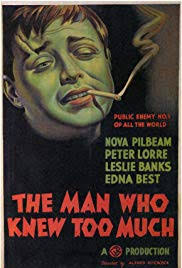
Bob Lawrence (Leslie Banks) and his wife Jill (Edna Best) are in Switzerland with their daughter Betty (Nova Pilbeam). They are on holiday and Jill is participating in a skeet shooting contest. She loses to another sharp shooter, Ramon (Frank Vosper). While there they have become friends with a French skier named Louis Bernard (Pierre Fresnay) who is also staying at their hotel. Also on holiday is a man known as Abbott (Peter Lorre). He is also staying at the same hotel. Everyone is jolly and having a good time.
Later after dinner Louis and Jill are dancing while Bob and his daughter Betty are relaxing and watching. All of a sudden Louis stiffens. Jill sees he has been shot. Before he dies he tells Jill to go to his room and find a note. Then he gives her the key to his room. He tells her to deliver the note to the British consul. When Bob comes to her side she tells him what Louis said. Bobs runs upstairs to Louis’s room and frantically searches for the note. He finally finds it and quickly reads; "Wapping G. Barbor make contact A. Hall March 21st". He leaves but is seen by Ramon, the hotel manager and the police. Ramon demands that he hand over the note but the police are right there and they take him to the manager’s office.
While Bob and Jill are being questioned Ramon is near-by. He hears Bob ask to talk to the British consul. While Jill is in talking to the police Bob is passed a note. He reads it and rushes in to show his wife before she tells the police anything. The note reads: "Say nothing of what you found or you will never see your child again." She faints. Bob grabs the note and quickly throws it into the small fireplace in the manager’s office.
The Lawrences return to England unable to do anything other than keep their silence. A man named Gibson tells them that Louis worked for the government. He says that Louis found out that a foreign statesman named Ropa is to be assassinated. Louis knew the details of the plot. The Lawrences maintain their silence. Fearing that the assassins will kill Betty anyway Bob and his friend Clive (Hugh Wakefield) must follow the clues on Louis note to try to find Betty while there is still time.
“The Man Who Knew Too Much” was released in 1934 and was directed by Alfred Hitchcock. Hitchcock re-made the film in 1956 using the same title. The movie is fast paced for the most part. Almost too fast. It’s a little easy to get lost in the moves of the plot. You’re on to the next clue before you’ve totally absorbed the last one but eventually enough of the threads come together to show you the whole picture. There is a subtle humor mixed in with the suspense. It adds a nice break to the tension.
This was Peter Lorre's second English-language film after “M” (1931). He was still unable to speak English, having only recently fled from Nazi Germany. He learned his lines phonetically. Lorre won the part by smiling and laughing whenever Hitchcock talked. Hitchcock didn’t know that Lorre had a very limited command of the English language.
The music played in the Royal Albert Hall scene was specifically written by composer Arthur Benjamin. Hitchcock hired the Australian specifically to write the piece. The music titled “The Storm Clouds Cantata” was used for both the 1934 version and the 1956 remake of the film.
The famous cameo appearance: Reportedly, it is about 36 minutes into the film after the dentist scene. A large man in a black trench coat moves from right to left near a street lamp while a bus passes from left to right. I saw him, but the collar of the trench coat is turned up so I could not see his face. The size alone says it could be Hitchcock.
Reference is made in the movie to the assassination of Austro-Hungarian Archduke Franz Ferdinand and his wife, Sophie Chotek that occurred in June 1914 by Bosnian Serb nationalist Gavrilo Princip. Austria suspected that the nation of Serbia was responsible. In July 1914 Austria-Hungary declares war on Serbia. This act heralded in World War I. World War I lasted until November 1918. Five years after this movie was made World War II started.

